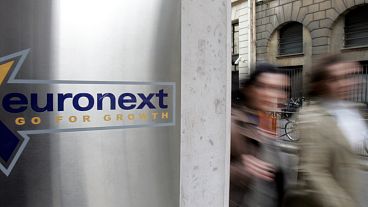A number of European companies have chosen to delist from European exchanges and enlist on US ones. Euronews Business looks at why.
A few decades back, London was seen as the place to be for stock exchanges, especially once smaller stock exchanges based in Cardiff, Edinburgh, Aberdeen and Leeds were merged with the bigger London Stock Exchange. However, now the global focus may be shifting to the US, particularly to exchanges such as the New York Stock Exchange and NASDAQ.
The European companies on the move
Flutter Entertainment, CRH and Smurfit Kappa are some of the latest European companies to delist from home exchanges in favour of US ones. This coincides with some UK and European companies choosing not to list in Europe at all but just go directly to US exchanges to launch their initial public offerings (IPOs). Dual listing, with a presence both in Europe and in the US, is also increasingly becoming an option.
Back in 2021, On Holding, the Swiss sneaker brand announced that it would be listing on the New York Stock Exchange (NYSE). Wise Plc, a UK fintech firm, announced that it would start selling US depository receipts. Argo Blockchain, a cryptocurrency miner, also opted for a US IPO.
Earlier in September this year, British semiconductor company Arm Holdings also joined this wave, listing on the NASDAQ after refusing to join the London Stock Exchange. This would mark the UK tech company’s return to the stock market following a hiatus of seven years after being purchased by Japan’s SoftBank. Arm has also been waiting for several months for the perfect moment for its flotation.
UK also failing to hold onto talent
This has seriously crushed London’s attempts to regenerate itself as the global hub for equities, despite the UK government’s increasing efforts to convince companies, especially tech ones to stay closer to home. The number of companies trading on the London Stock Exchange has been stagnating over the last few years.
The Arms Holdings case was especially sensitive, since the company had previously been dually listed on the FTSE 100 as well as the NASDAQ, before its acquisition and restructuring by SoftBank. In this instance, Rishi Sunak, as well as Boris Johnson and several London Stock Exchange representatives, had tried to get the company to agree to a full UK listing, or at the very least, a dual option, but in vain.
Why are European companies opting for the US?
The main allure of US exchanges is higher valuations, as well as much larger markets to tap into. The US Inflation Reduction Act has also earmarked billions of dollars for green and sustainable projects and industries. This has opened up a world of new opportunities for UK companies operating in these sectors, adding to the temptation of moving across the pond.
The US government has also made it far easier for foreign companies to invest in various sectors, unlike the UK, which is now scrambling to simplify some of its bureaucracy.
When it comes to UK tech companies, a listing on the NASDAQ is seen as a mine of opportunities, especially to lay the groundwork to receive more investments in the future. Semiconductor and AI companies have an added advantage - the US has been offering several more investment opportunities for this sector, in an attempt to become self-sufficient in semiconductor production. This would also go a long way in reducing the US’ dependence on China and Taiwan for semiconductors.
Another reason for more European IPOs on US exchanges is that most of the private companies going for IPOs are owned by US-based venture capital and private equity firms. As such, these firms often prefer that the IPO takes place on a US exchange, mainly because of their expertise and comfort in US markets.
Furthermore, US equities dominate world markets, with about 70% of the MSCI World Index being made up of US firms. These massive firms, such as Apple or IBM also command a market capitalization far higher than Canada, UK, Japan, Germany and France’s equities put together.
The US’ economic growth has also arguably been much faster than the UK or Europe’s especially since the UK economy is lagging behind many of its G7 peers. This has allowed US exchanges such as the S&P 500 to almost triple in value since the global financial crisis, whereas European exchanges such as the Euro Stoxx 50 have seen much slower growth.
US exchanges have also been boosted by outsized earnings from a number of big companies, such as Nvidia, which have multiplied their revenues several times in recent years.
This does not mean that there are no downside risks to the US economy. The US Federal Reserve’s monetary tightening policy is being closely watched, lest it pushes the US economy into recession.
Furthermore, if the Israel-Hamas conflict erupts into a wider Middle-Eastern conflict, price shocks to essential commodities such as food, energy and other raw materials could cause soaring inflation and supply chain backlogs once again. In this case, any sanctions that the US tries to impose on.
The US-China semiconductor tensions have also been running high in the last few years, with the US attempting to further block China’s access to sophisticated chips through export restrictions. China may very well counter through its own export sanctions, dealing a heavy blow to the US economy.
How can Europe keep its companies on home turf?
Currently, UK and European exchanges could potentially do a little more to keep companies at home, by focusing a little more on smaller mid-cap companies.
This could include benefits such as more stimulus measures, tax breaks, cheaper land and more. As these companies may still be some time away from contemplating a US debut, European exchanges could potentially have a nice window of time to convince them to stay.
However, in the long term, stronger regulations and more ease in investment for companies would be key in helping European exchanges stay afloat.
This is especially important post-Brexit, for the UK, as investors are already feeling more jittery regarding regulations and the viability of UK exchanges.
The UK also has the added advantage of a firmly established investor base, due to the strength and history of its financial services sector, which is just waiting to be leveraged.



